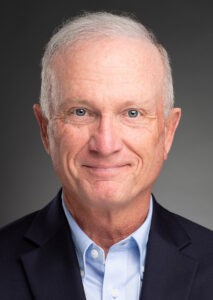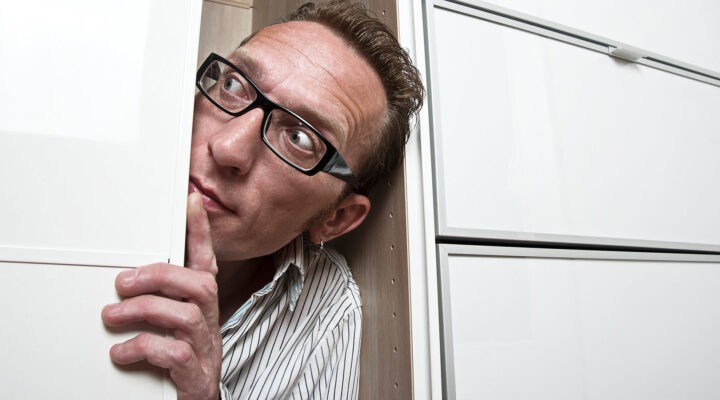In 1996, John Updike released his 17th novel, In the Beauty of the Lilies, a story about a Presbyterian minister, Clarence Wilmot, who loses his faith, leaves the ministry and becomes an encyclopedia salesman. In a strange case of art imitating life, Updike was narrating my story. I was a Baptist minister who had slowly been losing my faith. That same year, I left the ministry and embarked on a second career in technology sales.
While Updike captured my painful but liberating movement from Christianity to agnosticism, he failed to narrate the stigma and stereotypes associated with being an agnostic or atheist.

David Ramsey
Some equate atheism with being immoral and even amoral. Some of the criticism leveled at nonbelievers comes from the suspicion that those who do not believe in God could not possibly believe in anything else, moral or otherwise. Several years ago, a coworker, upon learning of my agnosticism, said, “So you just believe and do anything you want?” That he had engaged in several extramarital affairs was lost on my hypocritical colleague but not on me.
The notion that atheists and agnostics “do anything they want to do” is not uncommon; however, it is woefully and recklessly ignorant.
Comedian and atheist Penn Jillette says he’s often asked, “Without God, what’s stopping you from raping all you want?” Jillette’s response? “I do rape all I want, and the amount I want is zero.”
The late Christopher Hitchens had a standing offer to name a moral thing that was done in the name of religion that hadn’t been done by an atheist. Morality isn’t the sole provenance of religion, and immoral persons can be found in pews and prisons alike. A former member of my second congregation, a deacon in a cross-town Baptist church, axe murdered his wife and mother-in law, believing God directed him to do so. Thank God he wasn’t an atheist!
It is precisely because of these religious prejudices and stereotypes that many agnostics and atheists do not discuss their worldviews in public or even private settings, and if they do, they don’t necessarily tell the truth.
Timur Kuran, in Private Truths, Public Lies: The Social Consequences of Preference Falsification, argues that social pressures can make people say that they want and believe something they really don’t want or believe. Kuran calls this “preference falsification,” a phenomenon that occurs when you make an inaccurate public statement about your actual preferences or beliefs.
“Some of the criticism leveled at nonbelievers comes from the suspicion that those who do not believe in God could not possibly believe in anything else, moral or otherwise.”
These same social pressures have forced many LGBTQ persons to remain “in the closet,” for fear of condemnation (often at the hands of the Religious Right), rejection by family, and in the case of Matthew Shepard, torture and death. The 2015 Supreme Court decision to legalize same-sex marriage, however, gave some LGBTQ persons the courage to come out of the closet and affirm their true sexual identity. While we as a country and society have “miles and miles to go before we sleep” on the issue of LGBTQ rights, we have made measurable strides in the last few years.
The same can’t be said for our nation’s and society’s view of atheists and agnostics. In spite of the Obama administration’s passing of the International Religious Freedom Act in 2016, many Americans still do not want atheists teaching their children or marrying them. They would, according to surveys, prefer a female, gay, Mormon or Muslim President to having an atheist in the White House.
To be sure, no closet, neither LGBTQ nor atheist, has ever been padlocked. The choice to come of out of either closet is free and deeply personal. But if the LGBTQ closet is largely empty, the agnostic closet remains, with stigma and stain awaiting anyone who decides to leave it.
Last year, I wrote a book in which I discuss my journey from minister to agnostic and critique popular religious notions like “everything happens for a reason.” I have friends who reviewed my book online, some of whom masked their names to avoid being outed by their association with a controversial topic and agnostic author.
I dream of a day when the atheist closet is empty. When epistemic humility is the intellectual norm and credal dogmatism is the outlier. I envision a world where the burden of proof for an invisible supreme being falls on the believer, not the skeptic. Until then, I hope that the flickering flame of my own religious journey will be a beacon of courage and hope for those cloistered in the last closet.
David Ramsey was a Baptist minister for 10 years, serving as senior minister to two congregations in Virginia. He earned a bachelor’s degree from Wake Forest University and a master of divinity degree from Duke University Divinity School. He also was a fellow in religion and leadership development at Princeton Theological Seminary.
Related articles:
Atheists outpace evangelicals in knowledge of faith
In BNG webinar, Ryan Burge details the double threat to denominational churches in America


